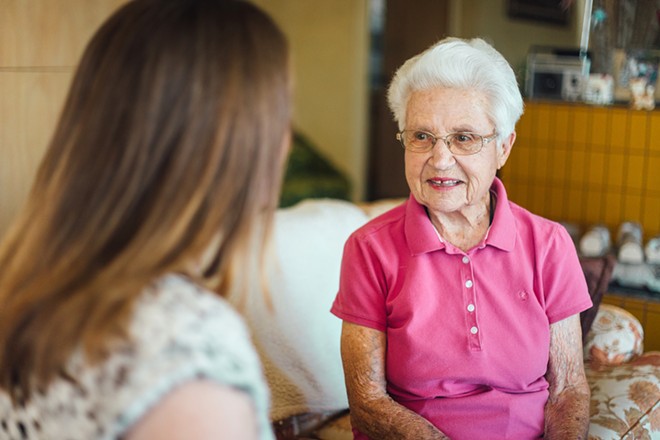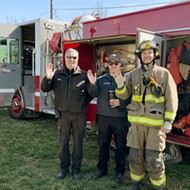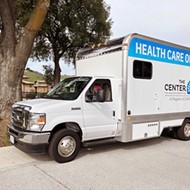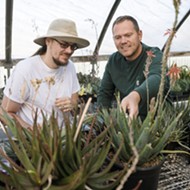Food Bank partners with Ride-On and Wilshire to deliver groceries directly to vulnerable residents' homes
By Peter Johnson
Photo Courtesy Of Wilshire Community Services
DIRECT DELIVERY Vulnerable, homebound residents in SLO County can get their groceries delivered via a new service courtesy of the SLO Food Bank, Ride-On Transportation, and Wilshire Community Services.
[{
"name": "Ad - Medium Rectangle CC01 - 300x250",
"id": "AdMediumRectangleCC01300x250",
"class": "inlineCenter",
"insertPoint": "8",
"component": "2963441",
"requiredCountToDisplay": "12"
},{
"name": "Ad - Medium Rectangle LC01 - 300x250",
"id": "AdMediumRectangleCC01300x250",
"class": "inlineCenter",
"insertPoint": "18",
"component": "2963441",
"requiredCountToDisplay": "22"
},{
"name": "Ad - Medium Rectangle LC09 - 300x250",
"id": "AdMediumRectangleLC09300x250",
"class": "inlineCenter",
"insertPoint": "28",
"component": "3252660",
"requiredCountToDisplay": "32"
}]
Back in March 2020, at the start of COVID-19, the San Luis Obispo Food Bank and SLO County worked together to launch a program to deliver groceries directly to the homes of medically vulnerable residents.
The Food Bank brought the bags of food to drop-off sites, and SLO County employees drove them the rest of the way to doorsteps. Demand for the service increased immediately, as homebound seniors sought to protect themselves from the virus.
"We saw the program go from 50 households to almost 1,000 per week within a month or month and a half," said Andrea Keisler, director of programs at the Food Bank. "The partnership really showed us what that need looked like, and what the logistics looked like."
When SLO County discontinued the service in July 2020, the Food Bank and a coalition of nonprofits across the county attempted to carry it on. But while deliveries continued, organizers knew the setup wasn't sustainable.
On March 18, the Food Bank announced the beginnings of a new partnership with Ride-On Transportation and Wilshire Community Services that aims to fortify and expand the popular program. Thanks to grants from the Community Foundation of SLO County and Feeding America, the three agencies say they are now equipped to deliver hundreds of grocery bags every week to local homes.
Keisler said that direct food deliveries have long been a need in SLO County that COVID-19 just shined a bright light on.
"Even before COVID, we were aware of this type of need in our community," she said. "We have clients who can't make it to our normal neighborhood food distribution sites because they have transportation issues or mobility issues. We live in a rural community—it's often necessary to have transportation."
Mark Shaffer, executive director of Ride-On Transportation, said that the Food Bank's proposal aligned perfectly with the nonprofit's mission of providing doorstep transportation. Under this new model, though, Ride-On's shuttles are delivering groceries, not people.
"We've got drivers, particularly in the middle of the day, that are available, so it worked out logistically," Shaffer said. "We use our scheduling software to just schedule the deliveries like we were picking someone up."
To be eligible for the direct delivery service, residents must: be at least 60 years old; meet income restrictions; and be homebound due to a medical condition, transportation issue, or health issue that makes going out a risk due to COVID-19.
Qualified community members or their primary caretakers can reach out to Wilshire Community Services—which is running administration for the program—at (805) 547-7025, Ext. 2216, or email [email protected] to get signed up. The weekly grocery bags include shelf-stable foods, fresh produce, and protein.
Shaffer said that the program, which already launched in South County, has been running "incredibly smoothly." The network is expected to soon expand to include 10 shuttle routes that cover all of SLO County. Both Shaffer and Keisler said that the grocery delivery service—and its setup as a partnership between three stalwart nonprofits—is unique in the U.S.
"Nobody else has it," Shaffer said. "It's something that all of us are willing to do forever. I'm hoping we'll continue to get grant money in the future to help us grow this and sustain it."
Fast fact
• Since it launched at the start of the COVID-19 pandemic, the SLO County UndocuSupport network has raised $435,000 to assist more than 600 local immigrant families. Funds have helped pay for rent and utility bills, transportation, groceries, and health needs. According to UndocuSupport, as of March 18 an estimated 9,000 undocumented residents in SLO County missed out on federal relief aid. UndocuSupport aims to fill the gap, and officials said it will soon be awarding "significant grants" to local groups serving immigrants. Locals can donate to UndocuSupport by visiting sloundocusupport.org/donate. Δ
Assistant Editor Peter Johnson wrote this week's Strokes and Plugs. Send tidbits to [email protected].









